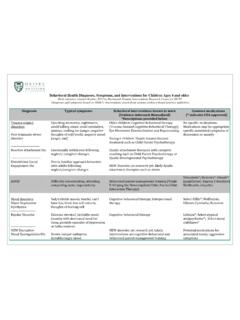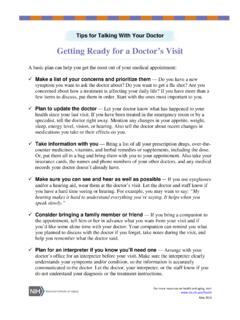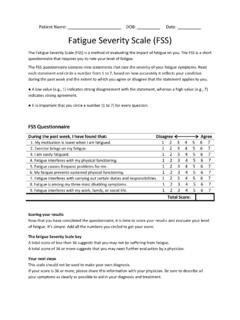Transcription of Mastering Your Adult ADHD
1 Mastering your Adult ADHD Editor- In- ChiefDavid H. Barlow, PhDScientific Advisory BoardAnne Marie Albano, PhDGillian Butler, PhDDavid M. Clark, PhDEdna B. Foa, PhDPaul J. Frick, PhDJack M. Gorman, MDKirk Heilbrun, PhDRobert J. McMahon, PhDPeter E. Nathan, PhDChristine Maguth Nezu, PhDMatthew K. Nock, PhDPaul Salkovskis, PhDBonnie Spring, PhDGail Steketee, PhDJohn R. Weisz, PhDG. Terence Wilson, PhDTREATMENTS THAT WORK 1 TREATMENTS THAT WORKCLIENT WORKBOOK1 STEVEN A. SAFRENSUSAN E. SPRICHCAROL A. PERLMANMICHAEL W. OTTOM astering your Adult ADHDA Cognitive- Behavioral Treatment ProgramSecond Edition 1 Oxford University Press is a department of the University of Oxford.
2 It furthersthe University s objective of excellence in research, scholarship, and educationby publishing worldwide. Oxford is a registered trade mark of Oxford UniversityPress in the UK and certain other in the United States of America by Oxford University Press198 Madison Avenue, New York, NY 10016, United States of America. Oxford University Press 2017 First Edition published in 2005 Second Edition published in 2017 All rights reserved. No part of this publication may be reproduced, stored ina retrieval system, or transmitted, in any form or by any means, without theprior permission in writing of Oxford University Press, or as expressly permittedby law, by license, or under terms agreed with the appropriate reproductionrights organization.
3 Inquiries concerning reproduction outside the scope of theabove should be sent to the Rights Department, Oxford University Press, at theaddress must not circulate this work in any other formand you must impose this same condition on any 978 0 19 023556 79 8 7 6 5 4 3 2 1 Printed by WebCom, Inc., Canada v About TREATMENTS THAT WORKOne of the most difficult problems confronting patients with various dis-orders and diseases is finding the best help available. Everyone is aware of friends or family who have sought treatment from a seemingly reputable practitioner, only to find out later from another doctor that the original diagnosis was wrong or the treatments recommended were inappropriate or perhaps even harmful.
4 Most patients, or family members, address this problem by reading everything they can about their symptoms, seek-ing out information on the Internet or aggressively asking around to tap knowledge from friends and acquaintances. Governments and health care policymakers are also aware that people in need do not always get the best treatments something they refer to as variability in health care health care systems around the world are attempting to correct this variability by introducing evidence-based practice. This simply means that it is in everyone s interest that patients get the most up-to-date and effec-tive care for a particular problem. Health care policymakers have also recognized that it is very useful to give consumers of health care as much information as possible, so that they can make intelligent decisions in a collaborative effort to improve physical health and mental health.
5 This series, Treatments That Work, is designed to accomplish just that. Only the latest and most effective interventions for particular problems are described in user-friendly language. To be included in this series, each treatment program must pass the highest standards of evidence available, as determined by a scientific advisory board. Thus, when individuals suf-fering from these problems or their family members seek out an expert clinician who is familiar with these interventions and decides that they are appropriate, patients will have confidence they are receiving the best care available. Of course, only your health care professional can decide on the right mix of treatments for particular program presents the first evidence-based psychologi-cal treatment for Adult attention-deficit/hyperactivity disorder ( Adult ADHD).
6 In this program, you will learn skills that directly attack the vi symptoms that make living with Adult ADHD so difficult. These symp-toms include difficulty focusing attention and being easily distracted, dif-ficulties with organization and planning, and impulsivity. This program can be effectively combined with medications, or for individuals who derive relatively little benefit from medications, this program may be suf-ficient on its own. This fully updated second edition of the Workbook contains worksheets, forms, and online resources to help you during treatment and is most effectively applied by working in collaboration with your H.
7 Barlow, Editor- in- Chief,Treatments ThatWorkBoston, MAReferencesBarlow, D. H. (2004). Psychological treatments. American Psychologist, 59, 869 , D. H. (2010). Negative effects from psychological treatments: A perspective. American Psychologist, 65(2), 13 of Medicine. (2001). Crossing the quality chasm: A new health system for the 21st century. Washington, DC: National Academy , R. K. & Barlow, D. H. (2010). Dissemination and implementation of evidence-based psychological interventions: A review of current efforts. American Psychologist, 65(2), 73 84. vii All forms and worksheets from books in the TTW series are made available digitally shortly fol-lowing print publication.
8 You may download, print, save, and digitally complete them as PDF s. To access the forms and worksheets, please visit Treatments ThatWork Forms and Worksheets Online ix Chapter 1 Information About Adult ADHD 1 Chapter 2 Overview of This Treatment Program for ADHD in Adulthood 9 Chapter 3 Informational Session with Spouse, Partner, or Family Member (if applicable) 17 Module 1 Organizing and PlanningChapter 4 The Foundation: Organizing and Planning Skills 23 Chapter 5 Organization of Multiple Tasks 31 Chapter 6 Problem Solving and Managing Overwhelming Tasks 39 Chapter 7 Organizational Systems 45 Module 2 Reducing DistractibilityChapter 8 Gauging your Attention Span and Distractibility Delay 53 Chapter 9 Modifying your Environment 61 Module 3 Adaptive ThinkingChapter 10 Introducing a Cognitive Model of ADHD 69 Chapter 11 Adaptive Thinking 83 Chapter 12 Rehearsal and Review of Adaptive Thinking Skills 93 Contents x Module 4 Additional SkillsChapter 13 Application of Skills to Procrastination (optional)
9 99 Chapter 14 Handling Slips 107 Appendix Forms and Worksheets 111 References 125 About the Authors 127 Mastering your Adult ADHD 1 CHAPTER 1 OVERVIEWThis chapter will provide you with information about ADHD in Adult -hood, how ADHD is diagnosed in adults, and an orientation to the cognitive- behavioral model of ADHD. This information will help you decide if this treatment program is right for To understand the characteristics of ADHD in adulthood To learn why ADHD symptoms continue in adults even after treatment with medications To understand that ADHD is a valid diagnosis for adultsWhat Is ADHD?Attention- deficit/ hyperactivity disorder (ADHD) is a valid, medical, psy-chiatric disorder.
10 ADHD begins in childhood, and many children with ADHD go on to have significant symptoms as adults. As shown in Figure , there are three major types of symptoms people have: poor attention, hyperactivity, and term disinhibition (lack of inhibition) is also sometimes used to describe the impulsivity and hyperactivity symptoms. Many people with ADHD have at least some symptoms of poor attention, some symptoms Information About Adult ADHD 2of hyperactivity, and some symptoms of impulsivity, although many peo-ple have symptoms that are predominately from one category. The term attention deficit disorder (ADD) is also sometimes used when an indi-vidual has the attentional symptoms but not the hyperactivity Is Not Related to Intelligence or LazinessPatients with ADHD can learn coping skills to manage associated dif-ficulties.





